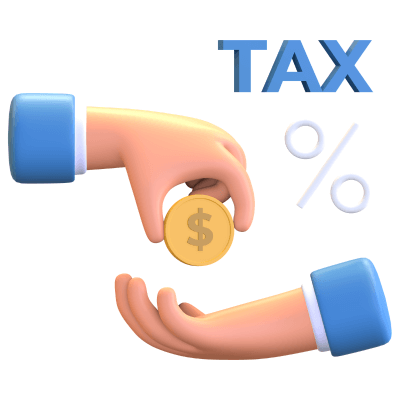As one of the leading cryptocurrency exchanges in Australia, CoinSpot has been serving its customers since 2013. Registered as a legal Digital Currency Exchange (DCE) with AUSTRAC, CoinSpot supports over 430 digital currencies and assets.
Now as crypto is gaining more popularity in Australia every passing year, traders are concerned about whether such a strong exchange complies with tax regulations or not. It is primarily because the Australian Taxation Office (ATO) imposes capital gains tax (CGT) rules on all crypto assets.

So does a popular exchange like CoinSpot comply with these tax laws? We have done the research, and shared the answer with you in detail in this blog.
Cryptocurrency Regulations in Australia
The Australian Taxation Office (ATO) is the Australian government's primary revenue collection department. It is in charge of collecting taxes from both businesses and individuals. We will discuss more about how your cryptocurrency assets comply with the tax law later in this article.
ATO's Stance on Cryptocurrencies
In Australia, crypto assets, including NFTs, are digital representations of value that can be transferred, stored, or traded electronically. According to our analysis, the ATO considers these crypto assets subject to the same tax rules as other assets.
Now crypto assets are not subject to any specific tax restrictions. Specifically, the tax treatment is determined by how you purchase, hold, and dispose of the assets. However, it is crucial to remember that the ATO does not consider crypto assets a form of money for tax purposes.

The Legalities Surrounding Cryptocurrency Reporting
As the government entity that creates and enforces tax regulations, ATO's most significant tax law for crypto assets is the capital gains tax (CGT).
CGT considers a rise in the value of your crypto assets to be a gain if you "dispose" of them during the course of the financial year. This disposal of crypto assets can be considered as selling, trading, exchanging, or using cryptocurrency.
For example, consider holding a certain amount of Bitcoin for 12 months. If the value of your Bitcoin increases during this period, your gains are taxable capital if you sell, trade, or use it, and must be included in the tax report.
CoinSpot's Adherence to ATO Regulations
As a popular and legitimate cryptocurrency exchange in Australia, CoinSpot complies with the ATO's tax regulations. Here's how:
Know Your Customer (KYC) Model:

In Australia, DCE-registered cryptocurrency exchanges must follow a Know Your Customer (KYC) model. This model includes processes that enable exchanges to verify their customer’s identity and the nature of the activities they plan to conduct on the exchange.
KYC models also allow exchanges to evaluate how much risk their customers may carry with them while registering for the exchange. Now as a DCE-registered exchange, CoinSpot is obliged to adhere to this KYC model that falls under the legal guidelines and regulations for financial institutions in Australia.
To fulfil this requirement, CoinSpot authenticates your legal identity and links the ID to your on-platform account.
Keeping Records
CoinSpot records and keeps crucial information on Australian users on its platform in compliance with AUSTRAC rules. The information in these records includes all of your investments over the previous fiscal year, including the initial and final values of your crypto portfolio.
Sharing Data
CoinSpot is required by law to share the data of their Australian users' crypto transactions. As per law, AUSTRAC requires and stores all your crypto transaction data. CoinSpot adheres to this law by forwarding this information to the ATO.
The ATO then utilises this data to enforce capital gains taxes. If necessary, the ATO can directly request certain data from CoinSpot, who must comply with these requests.
Reporting Responsibilities for CoinSpot Users
As an Australian citizen, you must fulfill the ATO's crypto asset tax-paying law. It is necessary to avoid any legal issues and problems. Now, as a user of one of the top crypto exchanges based in Australia, you must comply with this law as a CoinSpot user. Here's how you can do that:
Tax Obligations of CoinSpot Users
We understand that it can be confusing for CoinSpot users to understand how they can comply with the ATO's crypto CGT law. However, it is crucial that you understand the tax-paying process and fulfill your responsibility of paying tax on any gains of disposed crypto assets. We suggest consulting a tax professional to assist you with this.

As an Australian citizen, you must prepare and lodge your tax return within the financial year when you realise the gains. As Australia's financial year starts on the 1st of July and ends on the 30th of June every year, you can lodge your tax for crypto gains after June 30th.
Tips for CoinSpot Users
As a CoinSpot user, you can easily lodge your crypto tax. Here are some tips we suggest you consider when lodging your tax return:
CoinSpot shares dedicated instructions on using the mentioned tools to create tax records and reports.
The Role of CoinSpot in User Tax Reporting
We understand that it is difficult to figure out the process of complying with tax regulations and the ATO's requirements for cryptocurrency asset tax returns. However, CoinSpot does support its users in this regard through various means.
According to our research, some specific assistance solutions it offers to its users for tax reporting include:

Complete Support and Ease for Users in Tax Reporting
To help you lodge your crypto tax returns as per the ATO's laws, CoinSpot allows you to access the necessary files/transaction statements straightforwardly. Specifically, it includes:
Resources Provided by CoinSpot for Tax Reporting:
When we further researched about the exchange, we found that CoinSpot also has a dedicated section of articles on Tax Implications for Using Cryptocurrencies. This section allows you to explore how to use different tools for recording and creating tax reports with helpful guides.
As a CoinSpot user, you can also head onto this section to read articles about the information you need to collect for record keeping. It also shares helpful insights on exchanging your cryptocurrencies and/or using these assets as investments on the exchange.
Privacy Concerns Related to ATO Reporting
According to the ATO's tax-implying law on cryptocurrency assets, the Australian Taxation Office has its eyes on all Australian citizens' crypto ownership. This means that the ATO always watches your cryptocurrency activity as an Australian citizen.
Undeniably, while this law is for the security of the citizen's assets, it does raise privacy concerns for the traders in the country, even for CoinSpot users. So since this law was enacted in April 2019, the ATO has been closely monitoring your data. This includes you:
Other than storing all this information, once you hold a cryptocurrency portfolio as an Australian citizen — the ATO stores this data in its records for up to 7 years. At most, ATO is bound by the Archives Act 1983 to keep your data as a Commonwealth record.
However, there are instances when the ATO can disclose your personal information to overseas recipients. If it happens, this data is shared under the tax information exchange agreements between the countries.
Your personal information stored by the ATO may also be exposed to other countries in compliance with tax treaties.
CoinSpot's Privacy Policy Concerning User Data
While it is important that you pay your crypto gains tax as a CoinSpot user to avoid legal issues — CoinSpot ensures your privacy and security.
For one, CoinSpot protects your privacy in compliance with the Privacy Act 1988 (Cth) when collecting, handling, using, and disclosing your personal information.

As one of Australia's most trusted cryptocurrency exchanges, the exchange also deals with any complaints of breach of privacy law for its users. So if you face any privacy concerns like your data being leaked, you can count on CoinSpot to support you in taking appropriate action.
Moreover, you can also access your personal information CoinSpot has collected under ATO’s crypto regulation. While conducting our research on the exchange, we also found that the exchange gives you the control to correct the collected data, if there are any mistakes.
Conclusion
All in all, CoinSpot does report to ATO in compliance with the Australian cryptocurrency tax reporting law. The exchange shares all your necessary personal information and cryptocurrency asset-holding data, including your crypto gains, with the ATO.
Sharing this information and complying with the tax reporting law allows CoinSpot to operate as a legally abiding and secure cryptocurrency exchange. That being said, CoinSpot also gives control to its users to understand and file the crypto capital gains tax themselves.
With this assistance and transparent options to access your cryptocurrency assets statement and gains report, you can easily abide by the law as part of the crypto market in Australia.


